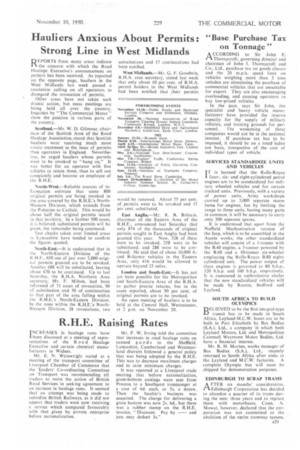R.H.E. Ra ising Rates
Page 33

If you've noticed an error in this article please click here to report it so we can fix it.
INCREASES in haulage rates have I been discussed at a meeting of representatives of the Road Haulage Executive and certain chemical manufacturers in Widnes.
Mr. E. N. Wainwright stated at a meeting of the transport committee of Liverpool Chamber of Commerce that the Traders' Co-ordinating Committee on Transport was recommending all traders to resist the action of British Road Services in seeking agreement to an increase in haulage rates. It seemed that an attempt was being made to subsidize British Railways, as it did not appear that traders were now receiving a service which compared favourably with that given by private enterprise before nationalization. Mr. F. W. Irving told the committee that increases in road haulage rates on canned goods to the Sheffield. Lancashire, Cumberland and Westmorland districts followed a general policy that was being adopted by the R.H.E. This was to decrease maximum charges and to raise minimum charges.
It was reported at a Liverpool trade meeting that before nationalization, grate-bottom castings were sent from Preston to a Southport ironmonger at a cost of 6d. each, or 5s. a dozen. Then the haulier's business was acquired. The charge for delivering a grate bottom was now 2s. 6d., but there was a rubber stamp on the R.H.E. invoice, "Discount. Pay .by. — and you may deduct Is."




















































































